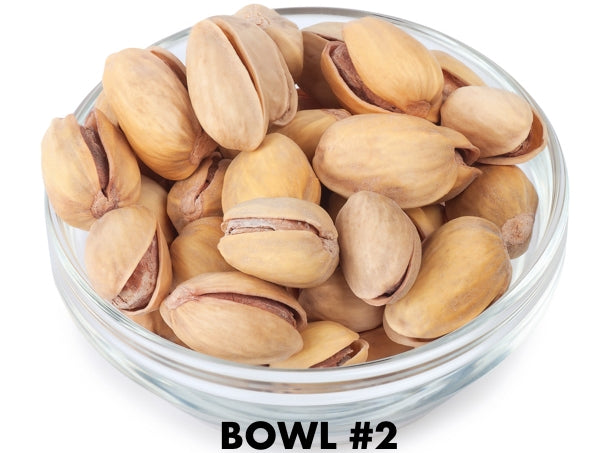
Everything was going fine, and then *BOOM* your progress stops.
There is no situation more motivationally deflating than hitting a weight loss plateau. In today's post I'm going to tell you the most common reasons that you've hit a wall with your progress and offer you fool-proof guidance for how to break through it and succeed with your weight loss goals.
#1 You're Accidentally Overeating.
Overeating is the most common reason for weight loss plateauing. You're probably thinking "there's no way I'm overeating, I feel like I'm starving!" There are two things wrong that thought, number one you don't have to feel like you're starving to lose weight and you probably need some help figuring out how to manage your diet. Number two, if you're only eyeballing your portion sizes, you can't be sure you're not overeating.
Can you tell which bowl has 3 servings or 90g of pistachios and which has 4 servings or 120g of pistachios, just by looking at them? Probably not, and that is the difference of 160 calories or about 20 minutes of cardio.


It's incredibly understandable to feel like you have a good grasp of something you've been instinctively doing since before you could walk or talk. However, you really can't trust your instincts or eyeballs just yet. Learning how to eat intuitively takes practice, and in time you can develop a solid understanding of the calorie contents of different foods and trust your eyeballs a bit more.
#2 You're Holding On To Water Weight Temporarily
Water weight may be your culprit if your weight loss has only stalled for a week or so. When you're new to strength training, recently started exercising, switched up your workout regimen, or are training more intensely than usual you're likely to encounter water retention.
Water weight retention from strength and resistance training is a common occurrence because when you train your muscles, they endure microscopic tears in the muscle fibers. When these tears happen, your body wraps your muscles in extra fluids to protect them during their recovery process which means holding onto excess water is both a good thing and only temporary.
The extra fluid briefly inflates your body weight and makes it appear as if you've hit a weight-loss plateau. However, if it has been more than a week, I'm sorry to say that water weight isn't what's holding you back.
#3 You're Overestimating the Number of Calories You Need
I remember being so frustrated that I was carefully watching my caloric intake every single week only to not see any progress when I stepped on the scale. Also, my progress photos weren't showing much change either. I was doing the work! Why didn't I see the results? I eventually figured out all the things I was doing wrong, addressed them, and the weight started falling off again.

As your weight changes, your caloric needs change, and I hadn't accounted for that. Naturally, my calorie goal when I started my fitness journey wasn't the same as halfway through my weight loss goal, and I had also built much more muscle mass. I needed to adjust the numbers.
#4 You're Overestimating Your Calories Burned
I find that the second most common reason for weight loss plateauing is overestimating your calories burned. You probably think you're burning more calories than you are and it's easy to make that mistake because people often equate fatigue with calories burned.
For example, walking more steps or standing on your feet for longer at work may be exhausting, but you likely didn't burn drastically more calories than your normal working day. Another common misconception is the amount of incremental calories burned by performing casual activities like walking around a mall and window shopping. It's unlikely that those calories burned are enough for an extra cheat meal. Being realistic and making changes to your workouts that increase their intensity and fat burning potential will resolve this issue.
#5 You're Not Building Muscle
Extra muscle mass helps boost your metabolism. The more muscle you have, the more incremental energy it takes to maintain that mass and thus the more calories you burn over time. Here's the thing though, it's not as though adding 5lbs of muscle means you will burn 200 more calories per day.

Increased muscle mass doesn't increase your muscle burning potential that drastically. However, it does prevent your workouts from becoming less effective over time, and it increases your insulin sensitivity which makes your body more efficient at burning fat. As you can see in the image above even with added muscle, your potential calories burned decrease as your weight decreases but at a lesser rate than if you fail to add muscle to your build.
#6 You Go Too Hard On Your Cheat Meals
It's a cheat MEAL my friend, not a cheat day, OR a cheat weekend. Take it easy, okay? Theoretically, if you are in a 500 calorie deficit every day for 6 days straight, then you'll burn 3,000 calories or nearly one full pound after six days. But if on day 7 if you go to the Cheesecake Factory with friends and order the Bistro Shrimp Pasta that's 3,120 calories in just one meal then..... You catch my drift??




